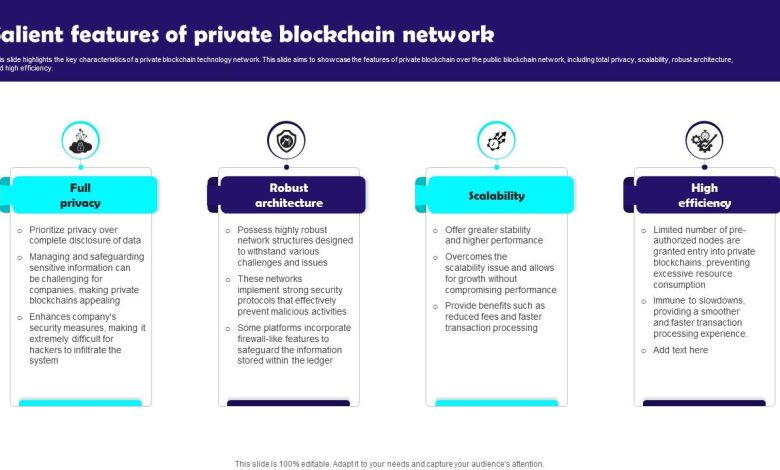Privacy and Security Features of Blockchain Networks

- Understanding the Basics of Blockchain Technology
- The Importance of Privacy in the Digital Age
- Exploring the Security Measures in Blockchain Networks
- How Blockchain Ensures Data Integrity and Confidentiality
- Challenges and Solutions in Blockchain Privacy and Security
- The Future of Privacy and Security in Blockchain Technology
Understanding the Basics of Blockchain Technology
Blockchain technology is a decentralized, distributed ledger system that securely records transactions across a network of computers. This technology is known for its transparency, immutability, and security features.
One of the key aspects of blockchain technology is its ability to provide privacy and security for users. By using cryptographic techniques, blockchain ensures that data stored on the network is secure and tamper-proof. This means that once a transaction is recorded on the blockchain, it cannot be altered or deleted, providing a high level of security for users.
Blockchain networks use a consensus mechanism to validate transactions and add them to the ledger. This process ensures that all transactions are verified by multiple parties on the network, making it extremely difficult for any single entity to manipulate the data. Additionally, blockchain technology uses encryption to protect the privacy of users, ensuring that sensitive information is kept confidential.
Overall, blockchain technology offers a secure and private way to conduct transactions and store data. Its decentralized nature and cryptographic security features make it an ideal solution for industries that require high levels of privacy and security. By understanding the basics of blockchain technology, users can take advantage of its many benefits while ensuring their data remains safe and secure.
The Importance of Privacy in the Digital Age
Privacy is a crucial aspect in today’s digital age, where personal information is constantly at risk of being compromised. With the rise of cyber threats and data breaches, it has become more important than ever to safeguard our sensitive data. Blockchain networks offer a solution to this problem by providing a secure and decentralized platform for transactions and data storage.
By utilizing cryptographic techniques and consensus algorithms, blockchain technology ensures that data is encrypted and stored in a tamper-proof manner. This not only protects the integrity of the information but also ensures that only authorized parties have access to it. This level of security is essential in maintaining privacy and preventing unauthorized access to personal data.
Furthermore, blockchain networks operate on a peer-to-peer basis, eliminating the need for intermediaries that may compromise privacy. Transactions are verified and recorded by multiple nodes in the network, making it virtually impossible for any single entity to manipulate the data. This decentralized approach not only enhances security but also ensures that privacy is maintained at all times.
Exploring the Security Measures in Blockchain Networks
When it comes to exploring the security measures in blockchain networks, it is essential to understand the various mechanisms put in place to ensure the privacy and integrity of data. One of the key features of blockchain technology is its decentralized nature, which means that data is stored across a network of computers rather than in a central location. This distributed ledger system makes it extremely difficult for hackers to manipulate or corrupt the data, as they would need to compromise a majority of the network to do so.
Another important security measure in blockchain networks is encryption. Data stored on the blockchain is encrypted using complex algorithms, making it nearly impossible for unauthorized parties to access or decipher the information. This encryption ensures that sensitive data remains secure and private, protecting users from potential breaches or leaks.
Additionally, blockchain networks utilize consensus algorithms to validate and confirm transactions. These algorithms require network participants to agree on the validity of transactions before they are added to the blockchain. This process helps prevent fraudulent activities and ensures the integrity of the data stored on the network.
Furthermore, blockchain networks often employ multi-factor authentication to verify the identity of users and prevent unauthorized access. By requiring multiple forms of verification, such as passwords, biometrics, or security tokens, blockchain networks add an extra layer of security to protect user accounts and data.
In conclusion, the security measures in blockchain networks play a crucial role in safeguarding the privacy and integrity of data. Through decentralization, encryption, consensus algorithms, and multi-factor authentication, blockchain technology provides a secure and reliable platform for storing and transferring information in a digital world.
How Blockchain Ensures Data Integrity and Confidentiality
Blockchain technology plays a crucial role in ensuring the integrity and confidentiality of data on networks. By utilizing cryptographic techniques, blockchain networks create a secure and tamper-proof environment for storing and transmitting information.
One way in which blockchain ensures data integrity is through the use of hashing algorithms. Each block in the chain contains a unique hash value that is generated based on the data it contains. Any alteration to the data in a block would result in a completely different hash value, making it easy to detect any unauthorized changes.
Furthermore, blockchain networks are decentralized, meaning that data is not stored in a central location but is distributed across multiple nodes. This distributed nature of blockchain makes it extremely difficult for hackers to compromise the data, as they would need to gain control of a majority of the nodes in the network simultaneously.
When it comes to data confidentiality, blockchain networks use encryption techniques to protect sensitive information. Data is encrypted before being added to a block, and only authorized parties with the correct decryption key can access the information. This ensures that data remains confidential and secure from unauthorized access.
In conclusion, blockchain technology provides a robust solution for ensuring data integrity and confidentiality on networks. By leveraging cryptographic techniques, decentralization, and encryption, blockchain networks offer a secure and trustworthy environment for storing and transmitting data.
Challenges and Solutions in Blockchain Privacy and Security
One of the main challenges in blockchain networks is ensuring privacy and security for users. As transactions are recorded on a public ledger, there is a risk of exposing sensitive information. To address this issue, developers have implemented various solutions to enhance privacy and security features.
- Encryption: Utilizing encryption techniques to secure data and prevent unauthorized access.
- Private transactions: Implementing protocols that allow for private transactions without revealing sensitive information.
- Multi-signature wallets: Requiring multiple signatures to authorize transactions, adding an extra layer of security.
- Zero-knowledge proofs: Verifying transactions without revealing any information other than the fact that the transaction is valid.
These solutions help to protect user privacy and secure transactions on the blockchain network. However, it is essential for users to stay informed about the latest developments in privacy and security features to ensure their data remains safe and secure.
The Future of Privacy and Security in Blockchain Technology
As blockchain technology continues to evolve, the future of privacy and security in this space is a topic of great importance. With the increasing use of blockchain networks for various applications, ensuring the protection of sensitive data and transactions is crucial.
One of the key features of blockchain technology that enhances privacy and security is its decentralized nature. By distributing data across a network of nodes, blockchain reduces the risk of a single point of failure or attack. This makes it more difficult for malicious actors to compromise the integrity of the system.
Another important aspect of privacy and security in blockchain technology is the use of cryptographic algorithms. These algorithms help secure transactions and data by encrypting information and ensuring that only authorized parties can access it. This adds an extra layer of protection to the network.
Furthermore, the use of smart contracts in blockchain technology can also contribute to privacy and security. Smart contracts are self-executing contracts with the terms of the agreement directly written into code. This not only automates processes but also reduces the risk of fraud or manipulation.
Overall, the future of privacy and security in blockchain technology looks promising. With continued advancements in encryption, decentralization, and smart contract technology, blockchain networks are becoming increasingly secure and private. As more industries adopt blockchain for various applications, ensuring the protection of sensitive data will be paramount.



